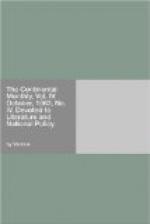Such are the facts. Let me now proceed to detail the causes of these remarkable results. The first element in the success of any Minister of Finance is the just confidence of the country in his ability, integrity, candor, courage, and patriotism. He may find it necessary, in some great emergency, like our rebellion, to diverge somewhat from the via trita of the past, and enter upon paths not lighted by the lamp of experience. He must never, however, abandon great principles, which are as unchangeable as the laws developed by the physical sciences. When Mr. Chase, in his first annual Treasury Report of the 9th of December, 1861, recommended his system of United States banks, organized by Congress throughout the country, furnishing a circulation based upon private means and credit, but secured also by an adequate amount of Federal stock, held by the Government as security for its redemption, it was very unpopular, and encountered most violent opposition. The State banks, and all the great interests connected with them, were arrayed against the proposed system. When we reflect that many of these banks (especially in the great State of New York) were based on State stocks, and in many States that the banks yielded large revenues to the local Government;—when we see, by our Census Tables of 1860 (p. 193), that these banks numbered 1642, with a capital paid up of $421,890,095, loans $691,495,580, and a circulation and deposits, including specie, of $544,469,134,—we may realize in part the tremendous power arrayed against the Secretary. This opposition was so formidable, that neither in the public press nor in Congress did this recommendation of Mr. Chase receive any considerable support. Speaking of the currency issued by the State banks, and of the substitute proposed by Mr. Chase, he presented the following views in his first annual Report before referred to, of December, 1861:—
’The whole of this circulation constitutes a loan without interest from the people to the banks, costing them nothing except the expense of issue and redemption and the interest on the specie kept on hand for the latter purpose; and it deserves consideration whether sound policy does not require that the advantages of this loan be transferred in part at least, from the banks, representing only the interests of the stockholders, to the Government, representing the aggregate interests of the whole people.
’It has been well questioned by the most eminent statesmen whether a currency of bank notes, issued by local institutions under State laws, is not, in fact, prohibited by the national Constitution. Such emissions certainly fall within the spirit, if not within the letter, of the constitutional prohibition of the emission of bills of credit by the States, and of the making by them of anything except gold and silver coin a legal tender in payment of debts. ’However this may be, it is too clear to be reasonably disputed




